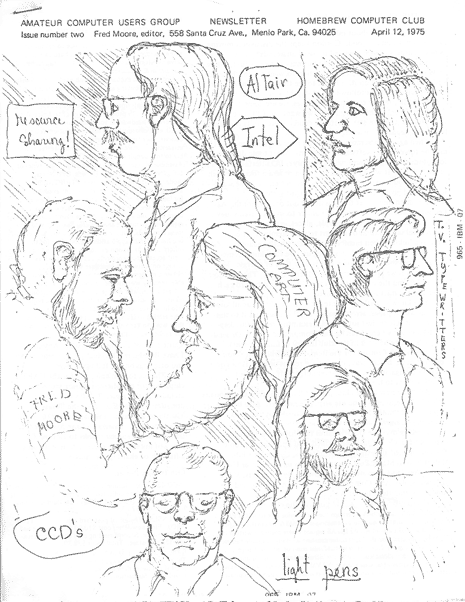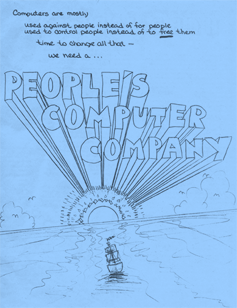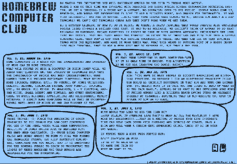 The creation of the personal computer, the Internet and open source design - the "computer revolution" to which I allude in the title - was not a linear, predictable process but one which involv- ed many different people exercising various as- pects of their beings – the artistic as well as the technical, and the visionary as well as the analytical. The creation of the personal computer, the Internet and open source design - the "computer revolution" to which I allude in the title - was not a linear, predictable process but one which involv- ed many different people exercising various as- pects of their beings – the artistic as well as the technical, and the visionary as well as the analytical.
I hope to demonstrate how it is both incorrect to credit the counterculture or the youth-based cultural and political movements of the 1960's with this revolution and yet correct to ascribe it to a more pervasive continuation of an ongoing "revolt against institutions".
Materialist analysis
The materialist view would hold that, in effect, the personal computer made itself, as a logical stage in the development of the technology.
Moore's Law, it is argued, made the personal computer revolution inevitable. While Moore's Law is a relatively simple semi-logarithmic projection of integrated circuit densities, it is by no means a law describing the operation of nature.
It was used by semiconductor companies as a metric to gauge their progress and as a means to moderate competition. In recent years it has faltered, since the costs of complying with its projections are no longer being met.
In addition, Moore's Law says nothing about the form of the products built with the resulting semiconductors.
Nothing in the projections for the development of computers indicated anything like the personal computer. The few who spoke about such things were relegated to the domain of science fiction and fantastic thinking.
When one such visionary, David Ahl, working for Digital Equipment Corporation managed in the early 1970's to demonstrate a prototype computer that could work on a desktop and be used by schoolchildren,
Kenneth Olson, the chief executive of Digital, widely respected as thoughtful and technologically skilled, famously commented that he could think of no reason why anyone would want a computer in the home.
The Hippy influence
It is sometimes said that "the hippies" entered the computer industry and diverted its course toward the personal computer. Since there is no accepted definition of a "hippy" it is impossible to address this statement on a logical level.
John Markoff has recently examined the issue of the relationship between the counterculture and the personal computer in a more careful fashion, noting the history of experimentation in consciousness alteration using psychedelic drugs, especially LSD, at the time and centered in the
same geographical area as the origin of personal
computing, and including some engineers who were later involved in the personal computer's development.
These experimenters would not be called hippies by any stretch of the imagination, being middle-class in their presentation to the world and keeping whatever epiphanies they had experienced mostly to themselves.
Despite predictions made at the time of a new age of creativity waiting to be brought on by the new psychedelic drugs, while some creative people may have experienced a widening of their horizons, there is almost no testimony to the effect that engineers and technologists were significantly aided in their work through the psychedelic experience.
New politics
Another phenomenon of the 1960's was the emergence of a politics originating from the black community's struggles of the civil rights move- ment. University youth participated and experienced their own epiphanies of the possibilities of what they called "participatory democracy".
Under the rubric of the "New Left" they set out to address the issues that motivated them by organizing directly within affected communities and generally attempting to apply the tactics of the black civil rights movement.
At no point did the radicals of the New Left consider technology as something other than an abstract aspect of the power structure which would be turned in the right direction once the larger questions of power and control were resolved. In this respect they differed not at all from their Marxist "Old Left" predecessors.
Any discussion within New Left circles that approached the idea of changing technology in order to empower people was met with either incomprehension or advice to drop the idea and engage in labor organizing at the technological workplace.
In this way the New Left radicals removed themselves from any involvement in the coming revolution.
Not one, but all
Now that I have asserted that neither the drug culture, nor the 1960's youth political culture, nor the inexorable development of technology were directly responsible for the development of the personal computer or the Internet, I must assert that, while there is no direct connection, in fact all of these factors were responsible indirectly.
My point is that human desire, thought and interactions are far more complex than simplistic, linear models would indicate, and that the personal computer and Internet were results of a very human process.
Therefore, instead of abstract talk about desire and process, I would like to focus on the people who nurtured these desires. I would like to acknowledge the invaluable help of Lena Diethelm in developing some of these ideas.
The Revolt Against Institutions
This revolt has been manifested in various forms at least since the Reformation and possibly since the Magna Carta.
The American revolution represents a major milestone in this process, and has provided a powerful encouragement to generations of rebels and people who, with no political program of their own, simply resist the demands of authority.
In the 1960's the major manifestation of this revolt was the American civil rights movement, in which black communities united to challenge unjust laws and customs and to demand full rights of citizenship. The senses of communality, solidarity and of moral righteousness were, as indicated earlier, highly contagious, and inspired various movements demanding various forms of equality, generally eroding the legitimacy of the power structure.
This eruption of the revolt against institutions became global in 1968, and it continues in various forms to this day.
Of extreme significance in this process was the first of the campus revolts in the U.S., the Free Speech Movement at the University of California at Berkeley in 1964. What started as a response to an attempt by the adminstration to suppress student activity supporting the civil rights movement grew over the course of three months to an all-out revolution that overthrew the system of power relations operating “in loco parentis” and forced the university to recognize the full civil and political rights of its student body.
[...]
Such an environment, especially as it reinforced itself at Berkeley and soon at other universities, has a much broader and deeper effect than merely stimulating some to make dramatic changes in their lives. It affects the way very many people see themselves in relation to society.
It causes people to consider new possibilities, new ways of doing things. It becomes, in effect, a zeitgeist – an intangible spirit of the times. The revolution opens new possibilites even for people who were skeptical spectators rather than direct participants.
This, I contend, is what happened at campuses all across the US during the decade from 1965 – 1975.
It was during this time that graduate students at electrical engineering and computer science departments designed and built the ARPANET, which begat the Internet. The principles of design and governance by informal cooperation amongst skilled participants – sound anarchist principles which have delivered stellar results – are the result of the zeitgeist of the revolt against institutions operating through the hephestian consciousness.
A Glimpse of Utopia
[...] one sees a cohort of people, mostly hephestians, working cooperatively through the open source movement to continue to build the tools in defiance of the zero-sum logic of classical economics.
One could see this as living out the utopia of Marx,based upon applying the most advanced technologies available and carried out by people who do not feel the sting of necessity as a primary motivation.
In this utopia one chooses one's field of endeavor and gains skill through learning and practice. One freely chooses one's project and expends effort in advancing it motivated not by immediate material gain but rather by the prospect of advancing one's standing among one's peers and of creating a lasting and elegant artifact that itself furthers the work of others.
Is this impractical? Useless? Destructive of individual enterprise?
Hardly. These people might say, like the Romanemperor, (and the hephestian architect Christopher Wren, who appropriated his epitaph) “If you seek my monument, look about you”. | |  
DOMPIEER MUSIC PROGRAM
Demonstrated by Steve Dompi at the only Homebrew Club meeting to take place at Peninusla School.
Steve Dompier presented what constituted a breakthrough in defining the personal computer as more than just a small com- puter. He was one of the first purchasers in 1975 of the Altair 8800 computer kit that started the personal computer industry.
(more)


PEOPLE'S COMPUTER COMPANY
“Computers are mostly used against people instead of for people
used to control people instead of free them- time to change all that -
we need a...
PEOPLE’S COMPUTER COMPANY” Produced from the early 70's onward, the People's Computer Center and the People's Computer Company Newsletters were a vital early spark that helped ignite the culture of people having a personal and creative relationship with computers. Meetings took place in the form of potlucks in their storefront location in Menlo Park, California.
 MIDPENINSULA FREE UNIVERSITY MIDPENINSULA FREE UNIVERSITY
MENLO PARK, CALIFORNIA
1965...
The formation of the Free University represents the coalescing of a wide variety of groups and individuals over a single issue -- that something is wrong, drastically wrong, with American society today. Individual social critiques varied greatly within the organization; some people mildly estrange, others completely alienated from our technocratic culture.
(more)


|